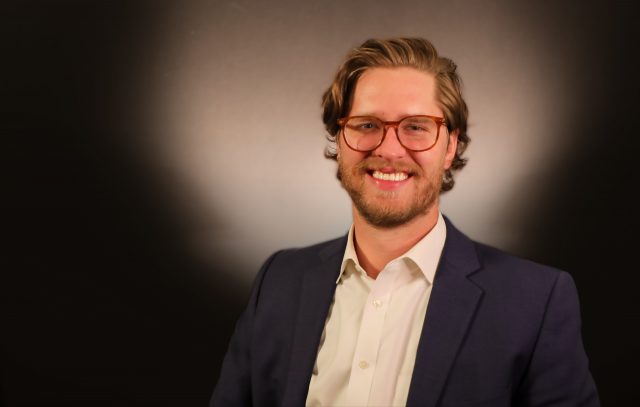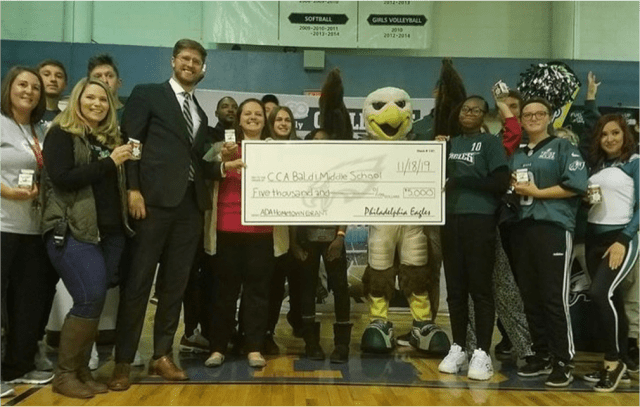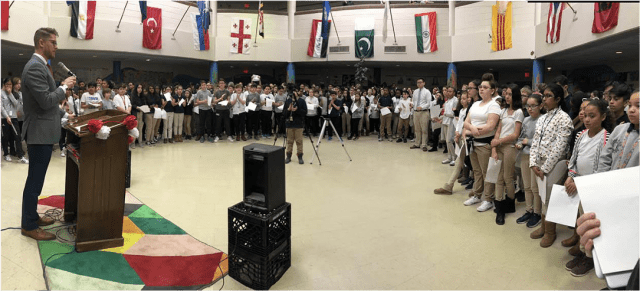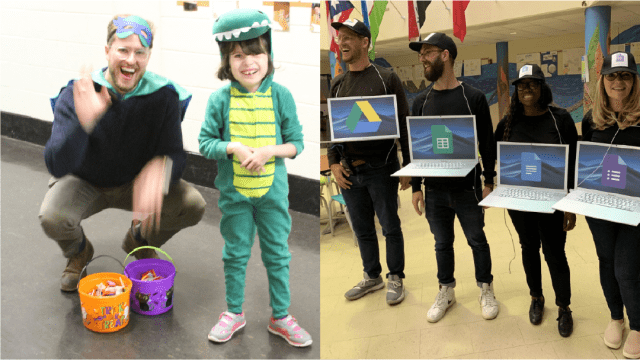Alumni Spotlight: Luke Hostetter (‘09), Principal of Baldi Middle School

Luke Hostetter, Principal of Baldi Middle School, served as an AmeriCorps Team Leader with City Year Philly in 2008-2009. He recently received the Lindback Award for Distinguished Principal Leadership, and delivered the alumni speech at CYP’s 2021 Graduation.
A year of service with City Year Philly has left a lasting impact on many of our AmeriCorps members, inspiring new ways of thinking about education equity, personal growth and leadership skills, and sometimes even a passion for a different career path. That’s exactly what happened for CYP alumnus Luke Hostetter.
After serving as a City Year Team Leader at Benjamin Franklin Elementary School in 2008-09, Luke was motivated to pursue a career in education, specifically as a school principal. He spent the next several years working as a history and social studies teacher at Bartram High School and KIPP Philadelphia Schools. More recently, Luke served as a PhillyPLUS Resident with the education nonprofit The New Teacher Project (TNTP), where he managed a team of teachers to design and implement a new social studies curriculum and align with Common Core standards.
Luke began his current role as Principal of Baldi Middle School in 2015. Earlier this year, he was a recipient of the Lindback Award for Distinguished Principal Leadership, earning recognition as one of the top principals in the School District of Philadelphia. He has also remained a steadfast champion for City Year Philly throughout the years, and was featured as our alumni speaker at last month’s 2021 Graduation ceremony. In his speech, Luke reflected on his time serving with CYP over a decade ago and offered advice for this year’s graduating class of Corps members:
“As I built connections and relationships with fellow Corps members, my world view expanded. My biases and privileges were checked. My identity as a white, cisgendered man, became clear. My calling and career path became more visible. I know what this experience can do and this Corps has demonstrated incredible perseverance. I urge you to channel that energy to your next chapter, to never forget the challenge and loss of this year but to also consider what gifts this moment has given you and use that to continue to make a difference and change the world.”
Read our Q&A with Luke to learn more about how his time serving with City Year has shaped his career to this day, his experiences as a school leader, and words of wisdom for our incoming and future AmeriCorps members.

What did you enjoy most about your time as a Corps member?
I enjoyed the lasting relationships that I was able to build with my fellow Corps members. Teammates became friendships, friendships became roommates, some went on to become members of my wedding party, and now our kids play together. It’s really cool to see how our relationships have evolved over time.
I also enjoyed the experience of being able to work in schools that put me on my current career path. As I think about where I sit today, I also realize how formative City Year was for my professional career. The experience I got working with the principal and serving in a school was so influential on my decision to become a teacher, and then to get into school leadership.
How did your time serving as a Corps member prepare you for your current role?
When I served as a Team Leader at Benjamin Franklin Elementary School, the principal really entrusted me to be able to lead my team and run a supportive program for the school. Her having faith in me to be able to do that when I was 22 years old has really inspired the way I lead today as a principal and was important for me in understanding how to empower our staff to be able to take initiative and be innovative to provide the best service for the school community.
A lot of the concerns that I deal with as a principal relate to the work that I did as a Corps member, in terms of understanding the needs of your school and then catering your work and service to meet those needs. At Benjamin Franklin Elementary, we served a community with a lot of language diversity, and we had to think through what that meant for designing our in-school service and afterschool program. As a principal, it’s the same thing: it’s understanding how you align resources to the highest areas of need.

What do you enjoy the most about your current role as Principal of Baldi Middle School? What opportunities do you see?
I enjoy working with our students and learning about their backgrounds and lives. We’re lucky to have a school with students from all over the world; we have over 30 spoken languages at our school, and each kid and their family has their own individual journey to get to where they are today. Being able to learn about students’ experiences and have that inform how to lead our school and make the best decisions for our community has been challenging, but super rewarding at the same time.
I also enjoy creative problem solving; figuring out where there are deficits in our school programming and what we can do to address them, and how to manage my staff members to be able to execute what’s best for students. We’ve had a lot of successes with that recently with things like our Special Olympics program, and I’m really excited about some other projects that we’re doing to upgrade our school grounds and facilities. After coming back from the pandemic, I think we have an opportunity to think about equity at a city level compared to our suburban peers and making sure that we’re upgrading school facilities to reflect what students deserve. For example, before the pandemic not every kid had access to a computer, and now all our students have laptops.
Supporting our English language learning students is another opportunity where there’s always room to improve. Beyond the 30 spoken languages at our school, half of our students speak a language other than English at home. Students spend most of their day at school, and there are some students who will enter our building and not talk for an entire day. As a school leader, that’s a tough thing to stomach. There are always opportunities to address and improve ways to engage our students who aren’t having an equitable experience at our school compared to their peers.

What does education equity mean to you?
I think education equity means providing supports and access for all students to be able to get the best possible education. A lot of it depends so much on the identity and needs of the individual student, and how we’re preparing our staff to be responsive to that. Ultimately, education equity is about identifying and closing opportunity gaps, and understanding that opportunity is going to look different for each kid.
It’s also important to recognize that education equity is a system-wide issue. Equity within education relates to equity within healthcare, access to public transportation, access to food, and even simple things like being able to play outside or participate in sports. Education equity within the school building is super important, but as educators we can’t put all of the burden on our shoulders to address it. Societal change needs to happen, and we all need to accept responsibility to create better opportunities for our students. And that’s what’s so great about City Year; there are some Corps members who stay in education, but there are a lot of folks who go into different sectors and take that mindset with them. We need people like that to influence system-wide change.
What advice would you give to current AmeriCorps members and those who might be considering serving with City Year?
For the Corps members who have served and are moving on, my advice is to stay connected to your City Year network and be proud of the fact that you served. Throughout the years since I served in the Corps, there have been so many opportunities to leverage those relationships and make connections, or to deepen existing connections. You just never know when you’re going to meet somebody who has a connection to City Year. For instance, my boss last year was Dr. John Tupponce, who’s now the Chief Operating Officer of City Year.
For someone who’s considering service, my advice is to just go for it. And to really embrace your year of service as an opportunity to grow. There were so many different areas that I was able to grow in from the experience—such as leadership development and understanding my personal identity as a leader—but beyond that being able to develop a career path. I graduated college having no idea what I wanted to do, but once I served with City Year, I knew that I wanted to lead a school one day. And that was because of the experience of working with teachers and my school principal as a Team Leader. The City Year experience was so foundational for me, and it helped open so many doors and open my mind to a career in education.
Are you considering a year or service or do you know someone who is? City Year Philly is currently accepting applications for the 2021-22 service year! To learn more and start your application, visit cityyear.org/apply-now.
Related stories
If you speak with an HBCU alum about their experience, you’ll quickly learn that service to the community is one...
Read more about Diversity, leadership and community: reflections of an HBCU alumNorm Goldberger (center, light blue shirt) and his Ballard Spahr colleagues host a meet & greet for the Bethune Elementary...
Read more about Spotlight on Norm Goldberger, City Year Philly’s 2024 Idealist of the YearMany City Year Philadelphia (CYP) alumni credit their year of service with transforming their lives, leading to lasting friendships, newfound...
Read more about City Year Philly Love Stories (part 2)At the start of the new fiscal year, CYP welcomed Kerri Strike-Stahller and Debby Kuhn as our new Site Board...
Read more about Introducing City Year Philly’s New Board Leadership: Kerri Strike-Stahller and Debby Kuhn















